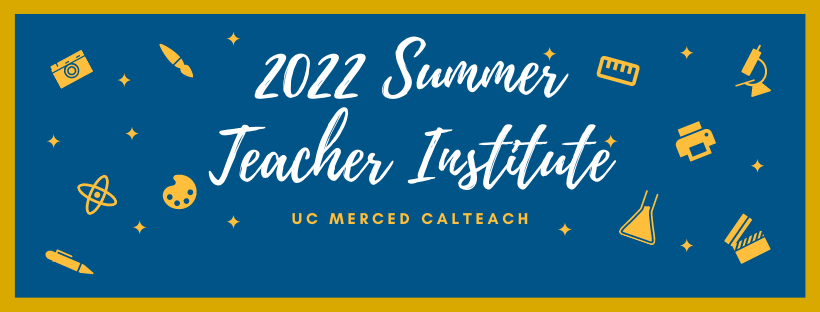
CalTeach Workshops
- CalTeach Workshops will be offering free virtual and in-person professional development opportunities for K-12 teachers through generous funding from EECU.
CCBM Webinars
- As part of the National Science Foundation (NSF) funded center's outreach mission and in partnership with CalTeach at UC Merced, CCBM will offer free STEM webinars for k-12 teachers at no cost via zoom.
2022-CalTeach Workshop Offerings
CS For All Workshop (Closed)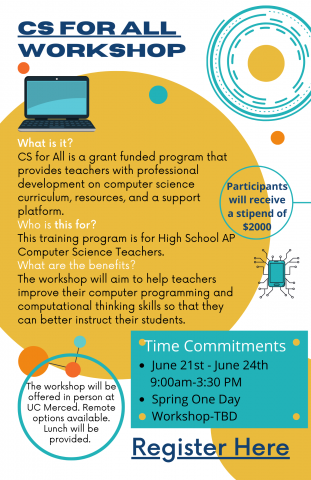
CS for All is a grant-funded program that provides teachers with professional development on computer science curriculum, resources, and a support platform. The workshop will aim to help teachers improve their computer programming and computational thinking skills so that they can better instruct their students.
Who is this for? This training program is for High School AP Computer Science Teachers.
Date:
June 21st-June 24th
9:00am-3:30pm
Location: UC Merced campus (lunch provided!), remote options available
Register here
**Each participant will receive a stipend of $2000
Seeing the Forests for the Trees - Math and imaging techniques for forestry and forest ecology (Closed)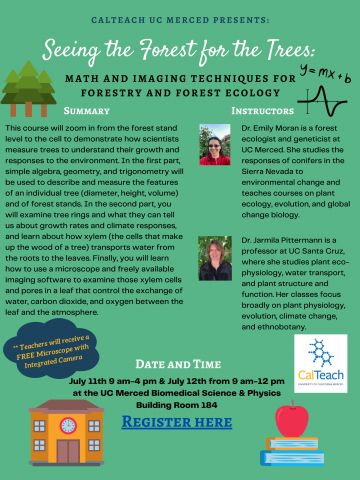
Instructed by Dr. Emily Moran and Dr. Jarmilla Pitterman
In this course, we will dive into the forest stand level to the cell to demonstrate how scientists measure trees to understand their growth and responses to the environment. Over the course, you will focus on using math principles for measurements of trees, examining tree rings and how it contributes to growth rates, and how to use a microscope to examine leaves.
Date:
July 11th, 9am -4pm
July 12, 9am -12pm
Location: UC Merced campus in Biomedical Sciences & Physics Building Room 184
Register Here
**Each participant will receive a digital microscope!
Past 2021-CalTeach Workshop Offerings
How Science Works (Closed)
Presented by Somnath Sinha
In this session, we will work through an online tool that allows us to observe and map the process of science and scientific investigation. We will target the myth that science is a linear process and map the often-nonlinear process of scientific investigations.
This workshop is open to ALL Elementary school teachers!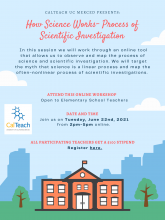
June 22nd
2pm-5pm PT
**This workshop is now CLOSED!**
5E Lesson Planning (Closed)
Presented by Somnath Sinha
This session will focus on aspects of the 5E model of instruction and how to create a robust 5E lesson and unit plan. We will discuss lesson planning in general, backward designing, learning theories related to 5E, alignment with NGSS, and create a detailed 5E lesson and unit plan.
This workshop is open to ALL Middle and High School teachers!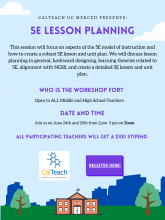
June 24th and June 25th
2pm-5pm PT
**This workshop is now CLOSED!**
Rethinking Laboratories-Transforming Cookbook Labs into a Scientific Inquiry (Closed)
Presented by Somnath Sinha
This session will focus on aspects of scientific inquiry and how we can practice and hone such skills among our students. We will work together to transform a cookbook lab into a scientific inquiry lab and formulate a general tool for such conversions.
This workshop is open to ALL Middle and High School teachers!
June 28th
2pm-5pm PT
*We will be hosting another date for this workshop so please check back soon*
Project-Based Learning and Instruction (Closed)
Presented by Somnath Sinha
This session will focus on aspects of project-based instruction and how to prepare a unit plan for project-based learning. We will discuss how PBI is different from other similar instructional strategies, crucial aspects of designing a project-based unit plan, and finally, design a unit plan.
This workshop is open to ALL Middle and High School teachers!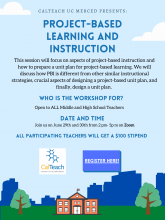
June 29th- 30th
2pm-5pm PT
**This workshop is now CLOSED!**
Seeing the Forest for the Trees: Math and Imaging Techniques for Forestry and Forest Ecology (Closed)
Presented by Dr. Emily Moran and Dr. Jarmila Pittermann
This course will zoom in from the forest stand level to the cell to demonstrate how scientists measure trees to understand their growth and responses to the environment. In the first part, simple algebra, geometry, and trigonometry will be used to describe and measure the features of an individual tree (diameter, height, volume) and of forest stands. In the second part, you will examine tree rings and what they can tell us about growth rates and climate responses, and learn about how xylem (the cells that make up the wood of a tree) transports water from the roots to the leaves. Finally, you will learn how to use a microscope and freely available imaging software to examine those xylem cells and pores in a leaf that control the exchange of water, carbon dioxide, and oxygen between the leaf and the atmosphere.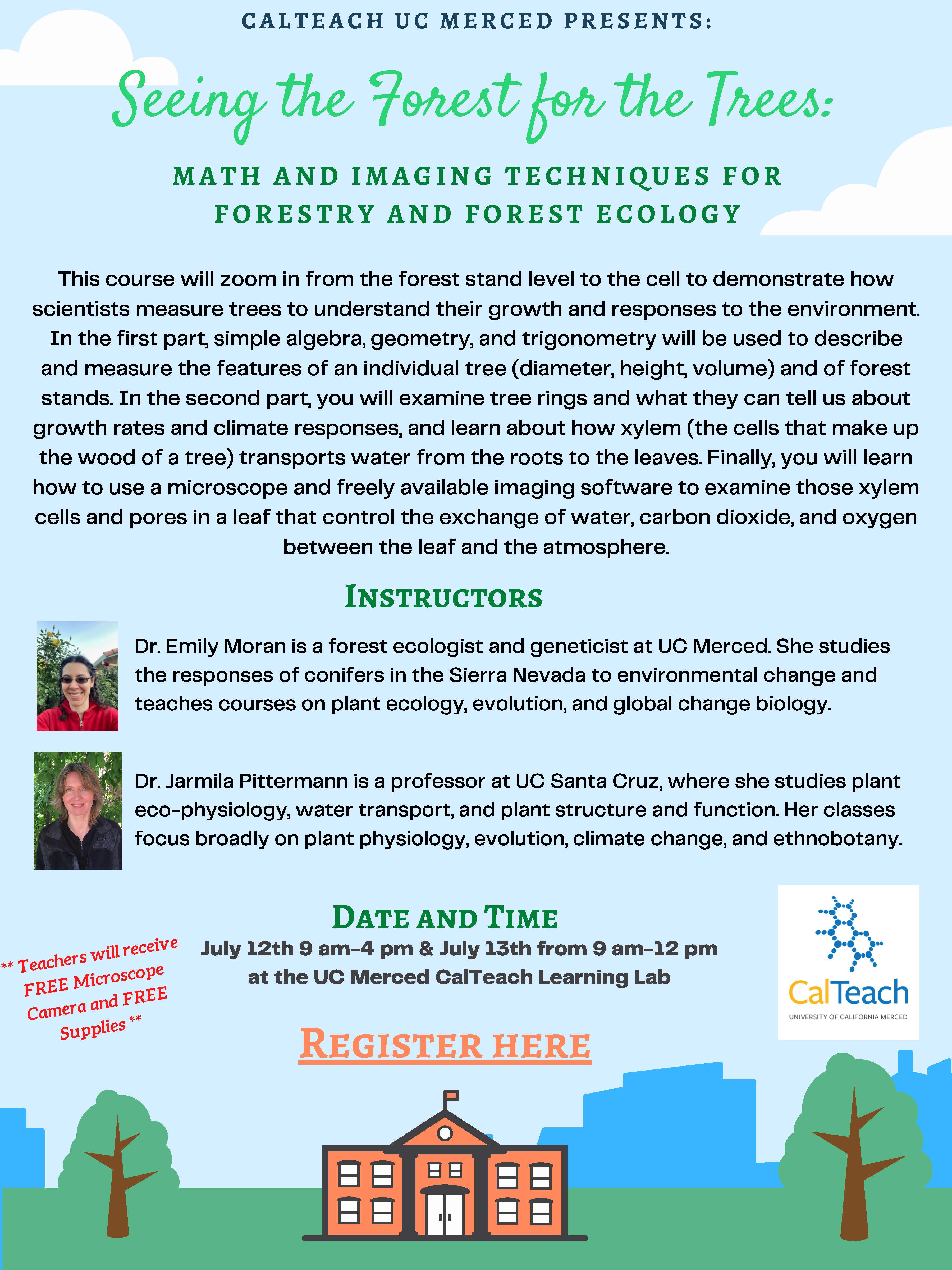
July 12th- 13th
9am-4pm PT (July 12th) and 9am-12pm PT (July 13th)
**This workshop is now CLOSED!**
Solar Car Challenge Training Workshop (Closed)
This event introduces solar energy and engineering design applications to participating students. Teachers who attend a CalTeach Solar Car Challenge training are eligible to register student teams and help them design their solar cars prior to the day of the race in March 2022.
Want to learn more about the Solar Car Challenge? Check out more details here.
July 27th- 28th
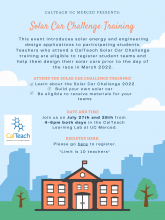 4pm-6pm PT (both days)
4pm-6pm PT (both days)
**This workshop is now CLOSED!**
CCBM Webinar Offerings
Tour of a Cell and Molecular Biology Lab
Presented by: Stephanie Woo, Assistant Professor, Molecular Cell Biology, University of California, Merced
The session will consist of a tour of the Woo lab. We will start with a brief description of our research on embryonic development before walking through our lab space. Participants will see work benches typical of most cell and molecular labs as well as more specialized equipment such as our confocal microscope. We will also meet various lab members and learn about their roles (grad student, lab manager, etc.). Pending approval from the Department of Animal Research, we will also include a tour of our zebrafish facility.
Prof. Woo is an Assistant Professor in the Department of Molecular Cell Biology at UC Merced. Her lab studies how epithelial tissues form during embryonic development. Dr. Woo earned her B.S. from the University of Texas, Austin, and a Ph.D. from the University of Wisconsin, Madison and was a postdoctoral researcher at the University of California, San Francisco.
June 22
1:00 PM-1:30 PM PT
Building a Bacterial Carousel
Presented by: Bin Liu, Assistant Professor, Physics, University of California, Merced
Whether a microbe can be "tamed" to perform desired tasks for humans seems not to have an obvious answer. Here, we will explore a few preliminary steps toward taming a bacterium, including using carefully built microstructures to turn freely swimming bacteria into micro carousels. We will also join together for a virtual tour of an automated microscope system that enables such studies.
Prof. Liu is an Assistant Professor in Physics at UC Merced. He is interested in simple and yet fundamental physical principles that govern complex microbial systems. He likes being inspired by games and toys, which he has applied to his research instruments, such as a "bacterial treadmill," for unveiling such principles.
June 23
1:00 PM- 2:00 PM PT
Mentorability
Presented by: John Newton, EXCEL! Program Coordinator, School of Natural Sciences, University of California, Merced
John will review the differences between coaching, role-modeling, sponsoring, and mentoring, as well as the components of being a good mentor or mentee. He will review the history, concepts, and methods behind a good mentoring experience and provide examples of college students who were able to find a good mentor and benefit from the experience.
John is the Program Coordinator and an Academic Coach for the School of Natural Sciences EXCEL! Program. He’s been at UC Merced for over three years now and has worked in Higher Education for over 15 years. John received his Bachelor of Arts in International Relations from Loyola Marymount University in Los Angeles, CA. He attended The University of Texas at Austin to receive his Master's Degree in Higher Education Leadership. John is a First-Generation college student and strongly supports First-Generation college student success.
June 23
10:00 AM-11:00 PT
Ethics in Research: How Far is Too Far?
Presented by: Daniel Wong, Assistant Dean for Academic & Postdoctoral Services, Graduate Division, University of California, Los Angeles
In this session, we will grapple with some of the most pressing ethical issues facing researchers today. Through a series of case studies, we will examine the foundations of ethical research and discuss some of the thorniest topics that students and researchers may encounter. At the end of the session, participants will leave with both answers and further questions about how to ethically conduct research.
Daniel Wong currently serves as the Assistant Dean for Academic and Postdoctoral Services in the Graduate Division at the University of California, Los Angeles. He and his staff administer programs and processes that encourage the academic progress and professional development of graduate students, visiting graduate researchers, and postdoctoral scholars. He earned his bachelor's degrees in Biochemistry and English from the University of Kansas and his Ph.D. in English Literature from the University of Illinois at Urbana-Champaign.
June 24
10:00 AM- 11:15 AM PT
How Would You Build a Machine that Sorts Cells?
Presented by: David Gravano, Technical Director of Cytometry, University of California, Merced
The session will begin with a discussion of why investigators need to characterize the properties of cells and sort them and how this is relevant to treating disease. We will then look at a Lego model of a “cell sorter” that utilizes motors and sensors to sort colored marbles. Lastly, we will see a real cell sorter in action sorting mouse blood cells and discuss its similarities and differences to the Lego model.
David Gravano is the Technical Director of Cytometry in the Stem Cell Instrumentation Foundry at UC Merced. He was a founding graduate student at UC Merced, beginning in 2005, where he went on to earn a Ph.D. in Quantitative Systems Biology with an emphasis in Immunology.
June 24 & June 25/ These sessions occur over 2 days
1:00 PM- 1:50 PM PT
Taking Pictures of Molecules: How Do We See the Invisible World?
Presented by: Michael Thompson, Assistant Professor, Chemistry and Biochemistry, University of California, Merced
Textbooks in chemistry, biology, and physics are filled with beautiful images depicting molecules with a wide variety of shapes, sizes, and physical properties. Our understanding of chemistry is central to our understanding of ourselves and our surroundings, and as the saying goes "seeing is believing." I will explain how we can visualize the invisible and "see" into the molecular world.
Professor Mike Thompson grew up in the San Fernando Valley of Southern California, where he was originally inspired to be a scientist by his outstanding high school STEM teachers. He has a deep connection to the UC system - he received his Bachelor's degree from Berkeley, he attended UCLA for his Ph.D., and then he was a postdoctoral fellow at UCSF before being hired as Assistant Professor of Chemistry and Biochemistry at UC Merced.
June 25
10:00 AM- 11:00 AM PT
Introduction to Computer Simulations in Physics, from Forest Fires to Salad Dressing
Presented by: Daniel Beller, Assistant Professor, Physics, University of California, Merced
We will have a hands-on introduction to how computer simulations are used in scientific research, focusing on a versatile kind of simulation called "lattice models." We will examine simulations of real-world topics such as forest fires, oil-water separation in salad dressing, and the spread of diseases. In a series of guided activities, participants will use and edit Python programs through an Internet browser and will discover small changes in parameters that dramatically affect the simulated results. Preparation instructions will be sent before the session.
Daniel Beller is a theoretical physicist and an Assistant Professor at the University of California, Merced in the Department of Physics. He and his research group use mathematical modeling and computer simulations to study the physics of soft materials, with properties intermediate between conventional liquids and solids. One of their major interests is liquid crystals, which flow like a liquid but behave in other ways like solid crystals. Professor Beller’s group also studies the physics of life at the cellular scale, aiming to understand collective effects that can only occur when many cells or many proteins work together.
July 12- 15/ These sessions occur over 4 days
11:00 AM- 12:00 PM PT
Visualizing Cells via Fluorescent Staining
Jose Zamora, Ph.D. Candidate, Materials and Biomaterials Science and Engineering, University of California, Merced
In this workshop, we will briefly cover stem cell biology and other cellular biological structures. The workshop will then shift to a live demonstration where we will show the audience how to visualize some of these structures under fluorescence.
Jose Zamora is a Ph.D. candidate at the University of California, Merced. His focus and interests lie in understanding how blood vessels emerge and mature. He is currently developing both computational and experimental models to advance current tools and techniques for accomplishing better blood vessel development in a laboratory environment.
July 12
1:00 PM- 2:00 PM PT
Combatting Misinformation: Accessible Ways of Incorporating Primary Sources in Your Science Classroom to Promote Critical Thinking in Students
Presented by: Melissa Goodlad, Ph.D. Candidate, Chemistry and Chemical Biology, University of California, Merced
To combat misinformation, students must develop the scientific literacy and critical thinking necessary to discriminate between science, pseudoscience, and nonsense. Peer-reviewed journals are the most reliable sources of information but are often full of intimidating jargon and have limited accessibility, while misinformation is free and sensationalized. This webinar will present accessible and time-efficient classroom resources for incorporating peer-reviewed journals into your curriculum. Teaching students to disseminate scientific journals in the classroom will equip them to critique information outside the classroom.
Melissa Goodlad is a fifth-year Ph.D. candidate in the Chemistry and Chemical Biology Department at UC Merced. Melissa taught Physics, Chemistry, and AP Chemistry in Fresno and Clovis Unified School Districts, where she achieved the district-wide highest pass rate for the AP Chemistry exam. Before beginning her high school teaching career, Melissa worked at CSU Fresno as a Supplemental Instructor for the chemistry curriculum, where she taught incoming students reading and study skills necessary for their college chemistry careers. After her dissertation, Melissa plans to return to teaching chemistry at the community college level.
This workshop is being rescheduled, please check back for an updated date soon!
1:00 PM- 2:30 PM PT
How to Win at Work: Making an Impact in Your Field
Presented by: Daniel Wong, Assistant Dean for Academic & Postdoctoral Services, Graduate Division, University of California, Los Angeles
How do we identify those tasks that are most important? How do we remain motivated to seek greater heights in work and life? Where do we begin when overwhelmed by tasks and obligations? This workshop presents the concept of “Deep Work” as a strategy for addressing these questions and more. Through an interactive workshop and discussion, we will explore why this strategy is an effective concept for achieving your goals; we will also address how to begin implementing it in our daily work and lives.
Daniel Wong currently serves as the Assistant Dean for Academic and Postdoctoral Services in the Graduate Division at the University of California, Los Angeles. He and his staff administer programs and processes that encourage the academic progress and professional development of graduate students, visiting graduate researchers, and postdoctoral scholars. He earned his bachelor's degrees in Biochemistry and English from the University of Kansas and his Ph.D. in English Literature from the University of Illinois at Urbana-Champaign.
July 14
1:00 PM -2:15 PM PT
College Readiness and STEM Disciplines
Presented by: Petia Gueorguieva, STEM Resource Center Coordinator, University of California, Merced
In an informal, interactive setting, we will discuss education/STEM education matters and college readiness. We will explore the value of collecting information and implementing good academic practices in high school, so students become college-ready and make educated college and financial choices. A presentation will be shared with the audience.
Petia Gueorguieva is the Coordinator for UC Merced’s STEM Resource Center, where she guides students to navigate their STEM majors and achieve their academic goals. Previously, she taught college chemistry and student success courses. Petia holds a Ph.D. in Chemistry from Louisiana State University and an M.S. in Physical Sciences Education from Sofia University, Bulgaria.
July 20
11:00 AM- 12:00 PM PT
Modeling Cells and Organelles on Computers
Presented by: Kinjal Dasbiswas, Assistant Professor, Physics, University of California, Merced & Patrick Noerr, Graduate Student, Physics, University of California, Merced
In this hands-on computational workshop, we will analyze microscopy images of molecular motors and then learn about the physics and mechanics of cell division. We will also use computer code in Python to model the formation of liquid droplets inside cells and see them divide like cells. Preparation instructions will be sent before the session.
Professor Kinjal Dasbiswas is a theoretical physicist working to uncover the principles behind the organization of biological matter occurring in cells and tissue. He uses mathematical modeling and computation to study the amazing scientific phenomena you might see under a microscope in a biology lab. This is his third year as an Assistant Professor at the University of California, Merced.
Patrick Noerr is a theorist interested in the role that mechanical interactions play in biological systems. He utilizes both analytic and computational methods to model and predicts the behavior of systems of cells. Mr. Noerr is currently finishing his second year as a Physics graduate student at the University of California, Merced.
July 20- July 22/ These sessions occur over 3 days
The Fungal World Wide Web
Presented by: Arvind Gopinath, Assistant Professor, Bioengineering, University of California, Merced
Hidden in the ground beneath us is an information superhighway made up of diverse biological cell populations that allow individuals who may be widely separated to communicate and help each other out. This biological World Wide Web is made up of fungi. Fungal bodies are made up of a mass of thin threads, known as a mycelium that link cells to the roots of plants as far as many meters away. We will look at these fascinating networks that aren't just sitting around; rather they are actively involved in biological, physical, and chemical processes and signaling including the sharing of nutrients and information.
Arvind Gopinath is a Professor of Bioengineering at the University of California, Merced. His lab currently studies how microbes such as bacteria and fungi grow and interact with their environment, and how these modes of interaction manifest in their biophysical and biomechanics properties.
November 8,10 and 15th (These sessions occur over 3 days)
4:00 PM- 5:00 PM PT

